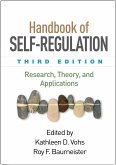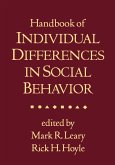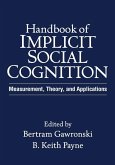Handbook of Self-Enhancement and Self-Protection
Herausgeber: Alicke, Mark D; Sedikides, Constantine
Handbook of Self-Enhancement and Self-Protection
Herausgeber: Alicke, Mark D; Sedikides, Constantine
- Gebundenes Buch
- Merkliste
- Auf die Merkliste
- Bewerten Bewerten
- Teilen
- Produkt teilen
- Produkterinnerung
- Produkterinnerung
This is the first major volume dedicated to the processes by which people exaggerate their virtues, deemphasize their shortcomings, or protect themselves against threatening feedback. Leading investigators present cutting-edge work on the key role of self-enhancing and self-protective motives in social perception, cognition, judgment, and behavior. Compelling topics include the psychological benefits and risks of self-enhancement and self-protection; personality traits and contextual factors that make certain individuals more likely to hold distorted views of the self; innovative approaches to…mehr
Andere Kunden interessierten sich auch für
![Mindfulness-Oriented Recovery Enhancement Mindfulness-Oriented Recovery Enhancement]() Eric L GarlandMindfulness-Oriented Recovery Enhancement75,99 €
Eric L GarlandMindfulness-Oriented Recovery Enhancement75,99 €![Health Psychology Health Psychology]() Charles AbrahamHealth Psychology231,99 €
Charles AbrahamHealth Psychology231,99 €![Handbook of Self-Regulation Handbook of Self-Regulation]() Handbook of Self-Regulation109,99 €
Handbook of Self-Regulation109,99 €![Handbook of Individual Differences in Social Behavior Handbook of Individual Differences in Social Behavior]() Handbook of Individual Differences in Social Behavior143,99 €
Handbook of Individual Differences in Social Behavior143,99 €![Adherence to Pediatric Medical Regimens Adherence to Pediatric Medical Regimens]() Michael A. RapoffAdherence to Pediatric Medical Regimens116,99 €
Michael A. RapoffAdherence to Pediatric Medical Regimens116,99 €![Adherence to Pediatric Medical Regimens Adherence to Pediatric Medical Regimens]() Michael A. RapoffAdherence to Pediatric Medical Regimens116,99 €
Michael A. RapoffAdherence to Pediatric Medical Regimens116,99 €![Handbook of Implicit Social Cognition Handbook of Implicit Social Cognition]() Handbook of Implicit Social Cognition144,99 €
Handbook of Implicit Social Cognition144,99 €-
-
-
This is the first major volume dedicated to the processes by which people exaggerate their virtues, deemphasize their shortcomings, or protect themselves against threatening feedback. Leading investigators present cutting-edge work on the key role of self-enhancing and self-protective motives in social perception, cognition, judgment, and behavior. Compelling topics include the psychological benefits and risks of self-enhancement and self-protection; personality traits and contextual factors that make certain individuals more likely to hold distorted views of the self; innovative approaches to assessment and measurement; and implications for relationships, achievement, and mental health.
Hinweis: Dieser Artikel kann nur an eine deutsche Lieferadresse ausgeliefert werden.
Hinweis: Dieser Artikel kann nur an eine deutsche Lieferadresse ausgeliefert werden.
Produktdetails
- Produktdetails
- Verlag: Guilford Publications
- Seitenzahl: 524
- Erscheinungstermin: 17. November 2010
- Englisch
- Abmessung: 267mm x 187mm x 35mm
- Gewicht: 1150g
- ISBN-13: 9781609180027
- ISBN-10: 160918002X
- Artikelnr.: 30598586
- Herstellerkennzeichnung
- Libri GmbH
- Europaallee 1
- 36244 Bad Hersfeld
- gpsr@libri.de
- Verlag: Guilford Publications
- Seitenzahl: 524
- Erscheinungstermin: 17. November 2010
- Englisch
- Abmessung: 267mm x 187mm x 35mm
- Gewicht: 1150g
- ISBN-13: 9781609180027
- ISBN-10: 160918002X
- Artikelnr.: 30598586
- Herstellerkennzeichnung
- Libri GmbH
- Europaallee 1
- 36244 Bad Hersfeld
- gpsr@libri.de
Mark D. Alicke, PhD, is Professor of Psychology at Ohio University. His main research interests are the psychology of the self-including the role of the self in social judgment, social comparison, and self-enhancement biases-and the psychology of blame and moral judgment. Dr. Alicke has served on the editorial board of the Journal of Personality and Social Psychology, as an Associate Editor of Personality and Social Psychology Bulletin, and is currently Editor of Self and Identity. Constantine Sedikides, PhD, is Professor and Director of the Centre for Research on Self and Identity at the University of Southampton, United Kingdom. His research focuses on self and identity and their interplay with emotion and motivation, close relationships, and group processes.
Introduction. Self
Enhancement and Self
Protection: Historical Overview and Conceptual Framework, Mark D. Alicke and Constantine SedikidesI. Neurocognitive Bases of Self
Enhancement and Self
Protection 1. Neural Bases of Approach and Avoidance, Eddie Harmon
Jones 2. Self
Enhancement: A Social Neuroscience Perspective, Jennifer S. Beer and Brent L. HughesII. Self
Enhancement and Self
Protection in Self
Construal 3. Self
Enhancement via Redefinition: Defining Social Concepts to Ensure Positive Views of the Self, Clayton R. Critcher, Erik G. Helzer, and David Dunning 4. Moral Hypocrisy: A Self
Enhancement/Self
Protection Motive in the Moral Domain, C. Daniel Batson and Elizabeth C. Collins 5. The Role of Time in Self
Enhancement and Self
Protection, Anne E. Wilson and Michael Ross 6. Reconciling Self
Protection with Self
Improvement: Self
Affirmation Theory, David K. Sherman and Kimberly A. HartsonIII. Perceptual, Judgmental, and Memory Processes in Self
Enhancement and Self
Protection 7. Of Visions and Desires: Biased Perceptions of the Environment Can Serve Self
Protective Functions, Shana Cole and Emily Balcetis 8. Self
Enhancement and Self
Protection in Social Judgment, Mark D. Alicke and Corey L. Guenther 9. Postdecisional Self
Enhancement and Self
Protection: The Role of the Self in Cognitive Dissonance Processes, Jeff Stone and Elizabeth Focella 10. The Positivity Bias and the Fading Affect Bias in Autobiographical Memory: A Self
Motives Perspective, John J. SkowronskiIV. Self
Enhancement and Self
Protection in Interpersonal, Relational, and Group Contexts 11. The Social Consequences of Self
Enhancement and Self
Protection, Vera Hoorens 12. Seeking Pleasure and Avoiding Pain in Interpersonal Relationships, Joanne V. Wood and Amanda L. Forest 13. An Attachment Perspective on Self
Protection and Self
Enhancement, Phillip R. Shaver and Mario Mikulincer 14. To Enhance or Protect the Self?: The Complex Role of Explicit and Implicit Self
Esteem, Tracy DeHart, Julie Longua, and Jennifer Smith 15. Attributions to Discrimination as a Self
Protective Strategy: Evaluating the Evidence, Brenda Major and Dina EliezerV. Self
Enhancement and Self
Protection in Developmental, Clinical, Health, Personality, andCultural Contexts 16. Self
Enhancement and Self
Protection in a Developmental Context, Kali H. Trzesniewski, Megan Peggy
Anne Kinal, and M. Brent Donnellan 17. The Breakdown of Self
Enhancing and Self
Protecting Cognitive Biases in Depression, Lauren B. Alloy, Clara A. Wagner, Shimrit K. Black, Rachel K. Gerstein, and Lyn Y. Abramson 18. When Self
Enhancement Drives Health Decisions: Insights from a Terror Management Health Model, Jamie Arndt and Jamie L. Goldenberg 19. Narcissistic Self
Enhancement: Tales of (Successful?) Self
Portrayal, Carolyn C. Morf, Stephan Horvath, and Loredana Torchetti 20. Cultural Perspectives on Self
Enhancement and Self
Protection, Chi
yue Chiu, Ching Wan, Shirley Y.Y. Cheng, Young
hoon Kim, and Yung
jui YangVI. Boundary Conditions and Methodological Issues in Self
Enhancement and Self
Protection 21. Academic Exaggeration: Pushing Self
Enhancement Boundaries, Richard H. Gramzow 22. Measurement of Self
Enhancement (and Self
Protection), Joachim I. Krueger and Jack C. Wright
Enhancement and Self
Protection: Historical Overview and Conceptual Framework, Mark D. Alicke and Constantine SedikidesI. Neurocognitive Bases of Self
Enhancement and Self
Protection 1. Neural Bases of Approach and Avoidance, Eddie Harmon
Jones 2. Self
Enhancement: A Social Neuroscience Perspective, Jennifer S. Beer and Brent L. HughesII. Self
Enhancement and Self
Protection in Self
Construal 3. Self
Enhancement via Redefinition: Defining Social Concepts to Ensure Positive Views of the Self, Clayton R. Critcher, Erik G. Helzer, and David Dunning 4. Moral Hypocrisy: A Self
Enhancement/Self
Protection Motive in the Moral Domain, C. Daniel Batson and Elizabeth C. Collins 5. The Role of Time in Self
Enhancement and Self
Protection, Anne E. Wilson and Michael Ross 6. Reconciling Self
Protection with Self
Improvement: Self
Affirmation Theory, David K. Sherman and Kimberly A. HartsonIII. Perceptual, Judgmental, and Memory Processes in Self
Enhancement and Self
Protection 7. Of Visions and Desires: Biased Perceptions of the Environment Can Serve Self
Protective Functions, Shana Cole and Emily Balcetis 8. Self
Enhancement and Self
Protection in Social Judgment, Mark D. Alicke and Corey L. Guenther 9. Postdecisional Self
Enhancement and Self
Protection: The Role of the Self in Cognitive Dissonance Processes, Jeff Stone and Elizabeth Focella 10. The Positivity Bias and the Fading Affect Bias in Autobiographical Memory: A Self
Motives Perspective, John J. SkowronskiIV. Self
Enhancement and Self
Protection in Interpersonal, Relational, and Group Contexts 11. The Social Consequences of Self
Enhancement and Self
Protection, Vera Hoorens 12. Seeking Pleasure and Avoiding Pain in Interpersonal Relationships, Joanne V. Wood and Amanda L. Forest 13. An Attachment Perspective on Self
Protection and Self
Enhancement, Phillip R. Shaver and Mario Mikulincer 14. To Enhance or Protect the Self?: The Complex Role of Explicit and Implicit Self
Esteem, Tracy DeHart, Julie Longua, and Jennifer Smith 15. Attributions to Discrimination as a Self
Protective Strategy: Evaluating the Evidence, Brenda Major and Dina EliezerV. Self
Enhancement and Self
Protection in Developmental, Clinical, Health, Personality, andCultural Contexts 16. Self
Enhancement and Self
Protection in a Developmental Context, Kali H. Trzesniewski, Megan Peggy
Anne Kinal, and M. Brent Donnellan 17. The Breakdown of Self
Enhancing and Self
Protecting Cognitive Biases in Depression, Lauren B. Alloy, Clara A. Wagner, Shimrit K. Black, Rachel K. Gerstein, and Lyn Y. Abramson 18. When Self
Enhancement Drives Health Decisions: Insights from a Terror Management Health Model, Jamie Arndt and Jamie L. Goldenberg 19. Narcissistic Self
Enhancement: Tales of (Successful?) Self
Portrayal, Carolyn C. Morf, Stephan Horvath, and Loredana Torchetti 20. Cultural Perspectives on Self
Enhancement and Self
Protection, Chi
yue Chiu, Ching Wan, Shirley Y.Y. Cheng, Young
hoon Kim, and Yung
jui YangVI. Boundary Conditions and Methodological Issues in Self
Enhancement and Self
Protection 21. Academic Exaggeration: Pushing Self
Enhancement Boundaries, Richard H. Gramzow 22. Measurement of Self
Enhancement (and Self
Protection), Joachim I. Krueger and Jack C. Wright
Introduction. Self
Enhancement and Self
Protection: Historical Overview and Conceptual Framework, Mark D. Alicke and Constantine SedikidesI. Neurocognitive Bases of Self
Enhancement and Self
Protection 1. Neural Bases of Approach and Avoidance, Eddie Harmon
Jones 2. Self
Enhancement: A Social Neuroscience Perspective, Jennifer S. Beer and Brent L. HughesII. Self
Enhancement and Self
Protection in Self
Construal 3. Self
Enhancement via Redefinition: Defining Social Concepts to Ensure Positive Views of the Self, Clayton R. Critcher, Erik G. Helzer, and David Dunning 4. Moral Hypocrisy: A Self
Enhancement/Self
Protection Motive in the Moral Domain, C. Daniel Batson and Elizabeth C. Collins 5. The Role of Time in Self
Enhancement and Self
Protection, Anne E. Wilson and Michael Ross 6. Reconciling Self
Protection with Self
Improvement: Self
Affirmation Theory, David K. Sherman and Kimberly A. HartsonIII. Perceptual, Judgmental, and Memory Processes in Self
Enhancement and Self
Protection 7. Of Visions and Desires: Biased Perceptions of the Environment Can Serve Self
Protective Functions, Shana Cole and Emily Balcetis 8. Self
Enhancement and Self
Protection in Social Judgment, Mark D. Alicke and Corey L. Guenther 9. Postdecisional Self
Enhancement and Self
Protection: The Role of the Self in Cognitive Dissonance Processes, Jeff Stone and Elizabeth Focella 10. The Positivity Bias and the Fading Affect Bias in Autobiographical Memory: A Self
Motives Perspective, John J. SkowronskiIV. Self
Enhancement and Self
Protection in Interpersonal, Relational, and Group Contexts 11. The Social Consequences of Self
Enhancement and Self
Protection, Vera Hoorens 12. Seeking Pleasure and Avoiding Pain in Interpersonal Relationships, Joanne V. Wood and Amanda L. Forest 13. An Attachment Perspective on Self
Protection and Self
Enhancement, Phillip R. Shaver and Mario Mikulincer 14. To Enhance or Protect the Self?: The Complex Role of Explicit and Implicit Self
Esteem, Tracy DeHart, Julie Longua, and Jennifer Smith 15. Attributions to Discrimination as a Self
Protective Strategy: Evaluating the Evidence, Brenda Major and Dina EliezerV. Self
Enhancement and Self
Protection in Developmental, Clinical, Health, Personality, andCultural Contexts 16. Self
Enhancement and Self
Protection in a Developmental Context, Kali H. Trzesniewski, Megan Peggy
Anne Kinal, and M. Brent Donnellan 17. The Breakdown of Self
Enhancing and Self
Protecting Cognitive Biases in Depression, Lauren B. Alloy, Clara A. Wagner, Shimrit K. Black, Rachel K. Gerstein, and Lyn Y. Abramson 18. When Self
Enhancement Drives Health Decisions: Insights from a Terror Management Health Model, Jamie Arndt and Jamie L. Goldenberg 19. Narcissistic Self
Enhancement: Tales of (Successful?) Self
Portrayal, Carolyn C. Morf, Stephan Horvath, and Loredana Torchetti 20. Cultural Perspectives on Self
Enhancement and Self
Protection, Chi
yue Chiu, Ching Wan, Shirley Y.Y. Cheng, Young
hoon Kim, and Yung
jui YangVI. Boundary Conditions and Methodological Issues in Self
Enhancement and Self
Protection 21. Academic Exaggeration: Pushing Self
Enhancement Boundaries, Richard H. Gramzow 22. Measurement of Self
Enhancement (and Self
Protection), Joachim I. Krueger and Jack C. Wright
Enhancement and Self
Protection: Historical Overview and Conceptual Framework, Mark D. Alicke and Constantine SedikidesI. Neurocognitive Bases of Self
Enhancement and Self
Protection 1. Neural Bases of Approach and Avoidance, Eddie Harmon
Jones 2. Self
Enhancement: A Social Neuroscience Perspective, Jennifer S. Beer and Brent L. HughesII. Self
Enhancement and Self
Protection in Self
Construal 3. Self
Enhancement via Redefinition: Defining Social Concepts to Ensure Positive Views of the Self, Clayton R. Critcher, Erik G. Helzer, and David Dunning 4. Moral Hypocrisy: A Self
Enhancement/Self
Protection Motive in the Moral Domain, C. Daniel Batson and Elizabeth C. Collins 5. The Role of Time in Self
Enhancement and Self
Protection, Anne E. Wilson and Michael Ross 6. Reconciling Self
Protection with Self
Improvement: Self
Affirmation Theory, David K. Sherman and Kimberly A. HartsonIII. Perceptual, Judgmental, and Memory Processes in Self
Enhancement and Self
Protection 7. Of Visions and Desires: Biased Perceptions of the Environment Can Serve Self
Protective Functions, Shana Cole and Emily Balcetis 8. Self
Enhancement and Self
Protection in Social Judgment, Mark D. Alicke and Corey L. Guenther 9. Postdecisional Self
Enhancement and Self
Protection: The Role of the Self in Cognitive Dissonance Processes, Jeff Stone and Elizabeth Focella 10. The Positivity Bias and the Fading Affect Bias in Autobiographical Memory: A Self
Motives Perspective, John J. SkowronskiIV. Self
Enhancement and Self
Protection in Interpersonal, Relational, and Group Contexts 11. The Social Consequences of Self
Enhancement and Self
Protection, Vera Hoorens 12. Seeking Pleasure and Avoiding Pain in Interpersonal Relationships, Joanne V. Wood and Amanda L. Forest 13. An Attachment Perspective on Self
Protection and Self
Enhancement, Phillip R. Shaver and Mario Mikulincer 14. To Enhance or Protect the Self?: The Complex Role of Explicit and Implicit Self
Esteem, Tracy DeHart, Julie Longua, and Jennifer Smith 15. Attributions to Discrimination as a Self
Protective Strategy: Evaluating the Evidence, Brenda Major and Dina EliezerV. Self
Enhancement and Self
Protection in Developmental, Clinical, Health, Personality, andCultural Contexts 16. Self
Enhancement and Self
Protection in a Developmental Context, Kali H. Trzesniewski, Megan Peggy
Anne Kinal, and M. Brent Donnellan 17. The Breakdown of Self
Enhancing and Self
Protecting Cognitive Biases in Depression, Lauren B. Alloy, Clara A. Wagner, Shimrit K. Black, Rachel K. Gerstein, and Lyn Y. Abramson 18. When Self
Enhancement Drives Health Decisions: Insights from a Terror Management Health Model, Jamie Arndt and Jamie L. Goldenberg 19. Narcissistic Self
Enhancement: Tales of (Successful?) Self
Portrayal, Carolyn C. Morf, Stephan Horvath, and Loredana Torchetti 20. Cultural Perspectives on Self
Enhancement and Self
Protection, Chi
yue Chiu, Ching Wan, Shirley Y.Y. Cheng, Young
hoon Kim, and Yung
jui YangVI. Boundary Conditions and Methodological Issues in Self
Enhancement and Self
Protection 21. Academic Exaggeration: Pushing Self
Enhancement Boundaries, Richard H. Gramzow 22. Measurement of Self
Enhancement (and Self
Protection), Joachim I. Krueger and Jack C. Wright








